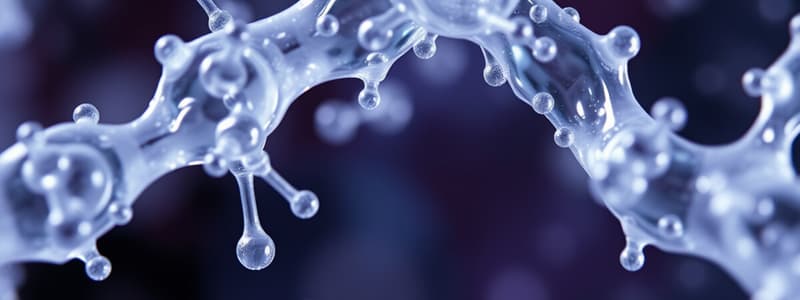Podcast
Questions and Answers
Which characteristic is NOT true of enzymes?
Which characteristic is NOT true of enzymes?
- They are specific to certain substrates.
- They increase the equilibrium of a reaction. (correct)
- They operate effectively in smaller quantities.
- They are unchanged at the end of the reaction.
What defines the specificity of an enzyme?
What defines the specificity of an enzyme?
- The functional group of the substrate and the enzyme. (correct)
- The temperature at which it operates.
- The presence of inhibitors in the reaction.
- The speed at which it catalyzes a reaction.
Which statement accurately describes the role of the active site of an enzyme?
Which statement accurately describes the role of the active site of an enzyme?
- It is located in the interior of the enzyme.
- It produces energy to drive the reaction.
- It binds substrates to form an enzyme-substrate complex. (correct)
- It is where the enzyme is permanently altered.
What is activation energy?
What is activation energy?
Which model explains how enzymes fit their substrates?
Which model explains how enzymes fit their substrates?
Cofactors or coenzymes are important because they:
Cofactors or coenzymes are important because they:
What happens to the enzyme after the substrate is converted to product?
What happens to the enzyme after the substrate is converted to product?
Enzymes are characterized by their efficiency. What factor contributes to this efficiency?
Enzymes are characterized by their efficiency. What factor contributes to this efficiency?
What pH condition is most likely to lead to the denaturation of an enzyme?
What pH condition is most likely to lead to the denaturation of an enzyme?
What does the Km constant reflect about an enzyme?
What does the Km constant reflect about an enzyme?
In the Michaelis-Menten model, what occurs after the enzyme binds with the substrate to form the ES complex?
In the Michaelis-Menten model, what occurs after the enzyme binds with the substrate to form the ES complex?
How does the rate of reaction relate to the free energy of activation in enzyme-catalyzed reactions?
How does the rate of reaction relate to the free energy of activation in enzyme-catalyzed reactions?
What happens to enzyme activity as pH moves away from its optimum level?
What happens to enzyme activity as pH moves away from its optimum level?
Which statement is true regarding the effect of enzymes on the free energy of reactants and products?
Which statement is true regarding the effect of enzymes on the free energy of reactants and products?
What is the consequence for enzyme activity if the R groups of amino acids in the active site are improperly charged?
What is the consequence for enzyme activity if the R groups of amino acids in the active site are improperly charged?
Which of the following best describes the relationship between substrate concentration and reaction velocity in the Michaelis-Menten model?
Which of the following best describes the relationship between substrate concentration and reaction velocity in the Michaelis-Menten model?
What does the maximum velocity (Vmax) represent in enzyme activity?
What does the maximum velocity (Vmax) represent in enzyme activity?
How does substrate concentration affect reaction rate when enzyme concentration is constant?
How does substrate concentration affect reaction rate when enzyme concentration is constant?
What effect does a competitive inhibitor have on the apparent Km of a substrate?
What effect does a competitive inhibitor have on the apparent Km of a substrate?
Which factor can cause a loss of enzyme activity due to a change in temperature?
Which factor can cause a loss of enzyme activity due to a change in temperature?
What occurs when substrate concentration increases beyond Vmax?
What occurs when substrate concentration increases beyond Vmax?
Which statement accurately describes noncompetitive inhibition?
Which statement accurately describes noncompetitive inhibition?
Which of the following statements is true regarding pH and enzyme activity?
Which of the following statements is true regarding pH and enzyme activity?
What is the primary action of penicillin as an enzyme inhibitor?
What is the primary action of penicillin as an enzyme inhibitor?
Which temperature is typically considered optimum for human enzymes?
Which temperature is typically considered optimum for human enzymes?
How does noncompetitive inhibition affect Vmax?
How does noncompetitive inhibition affect Vmax?
What happens to acetylcholine in the presence of the nerve gas sarin?
What happens to acetylcholine in the presence of the nerve gas sarin?
What describes the relationship between reaction rate and substrate concentration in most enzymes?
What describes the relationship between reaction rate and substrate concentration in most enzymes?
What happens to the reaction rate when the substrate concentration is low?
What happens to the reaction rate when the substrate concentration is low?
Which of the following best describes the binding of a noncompetitive inhibitor?
Which of the following best describes the binding of a noncompetitive inhibitor?
Which enzyme is inhibited by the nerve gas sarin?
Which enzyme is inhibited by the nerve gas sarin?
What is the role of glycoprotein peptidase in bacteria?
What is the role of glycoprotein peptidase in bacteria?
What does a low Km value indicate about an enzyme's affinity for its substrate?
What does a low Km value indicate about an enzyme's affinity for its substrate?
Which condition describes a zero-order reaction with respect to substrate concentration?
Which condition describes a zero-order reaction with respect to substrate concentration?
Flashcards are hidden until you start studying
Study Notes
Enzyme Characteristics and Function
- R groups of amino acids in the active site have specific charges that influence substrate binding.
- Ionization of these groups is affected by pH; optimal enzyme activity occurs at a specific pH.
- Tertiary structure stability is crucial; extreme pH levels can lead to enzyme denaturation.
- Enzyme activity is typically narrow in pH range; each enzyme has a unique optimum pH for maximum activity.
Reaction Rate and Activation Energy
- Substrate molecules must have sufficient energy to overcome an energy barrier to be converted into products.
- Reaction rate is influenced by the number of molecules that can transition to product; lower activation energy results in faster reactions.
- Enzymes do not alter the free energies of reactants and products; they do not change the reaction equilibrium.
Michaelis-Menten Model
- The Michaelis-Menten model describes enzyme-catalyzed reactions, showing the formation of the enzyme-substrate complex (ES).
- The Michaelis-Menten equation relates reaction velocity to substrate concentration.
- The Km constant reflects the enzyme's affinity for a substrate; it is the substrate concentration at which the reaction velocity is half of Vmax.
Characteristics of Enzymes
- Enzymes serve as catalysts, increasing reaction rates without being consumed.
- They are proteins, efficient, specific, and effective in small amounts.
- Enzymes require cofactors or coenzymes and can operate through multiple biochemical pathways.
Active Site and Mechanism of Action
- The active site of an enzyme binds the substrate, forming an enzyme-substrate complex that transforms into a product.
- Two binding models: lock-and-key and induced-fit, explain how enzymes interact with substrates.
- Activation energy must be absorbed to reach a transition state; enzymes lower this activation energy.
Factors Affecting Enzyme Action
- Reaction velocity increases with substrate concentration until reaching Vmax, where enzyme active sites are saturated.
- Different factors like temperature and pH significantly impact enzyme activity:
- Optimal temperature for most human enzymes is around 37°C.
- pH affects amino acid ionization at the active site; low Km indicates high substrate affinity, while high Km indicates low affinity.
Enzyme Kinetics and Order of Reaction
- The reaction rate is directly proportional to enzyme concentration.
- At substrate concentrations greater than Km, the reaction rate is constant (zero-order kinetics).
- The Lineweaver-Burk plot provides a double reciprocal plot allowing for easier determination of Vmax and Km.
Enzyme Inhibition
- Inhibitors reduce enzyme-catalyzed reaction velocity; they can be reversible or irreversible.
- Competitive inhibitors compete with the substrate for the active site, increasing apparent Km without affecting Vmax.
- Noncompetitive inhibitors bind to a different site, decreasing Vmax while leaving Km unchanged.
Application of Enzyme Inhibitors
- Enzyme inhibitors can be pharmaceutical agents:
- Sarin inhibits acetylcholinesterase, causing a toxic accumulation of acetylcholine, leading to paralysis.
- Penicillin inhibits bacterial peptidoglycan synthesis, effectively preventing bacterial cell wall formation and division.
Studying That Suits You
Use AI to generate personalized quizzes and flashcards to suit your learning preferences.




